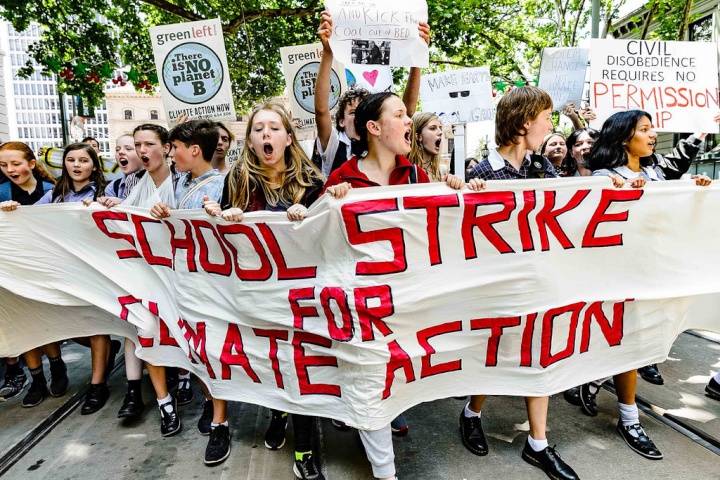
Melbourne School Strike for Climate Action 2. Credit: Julian Meehan
Strike organisers said students from about 100 schools had signed up for the event on 15 March and principals said they had asked the Education Ministry for guidance.
One of the organisers of the strike in New Zealand, Sophie Handford, said she was not aware of any schools forbidding students from participating in the event.
“We’ve found a good mix – some wondering how it will fit into the curriculum, others not willing to be seen supporting it but they are kind of supporting it in the background. [At] some schools, the principals are really supportive,” she said.
Ms Handford said some students were worried about missing a day of lessons or being recorded as truant and she urged them to consider what lack of action on climate change would mean for their future.
She said the strike had clear goals.
“We would like our government and governments worldwide to do everything in their power to limit global warming to no more than 1.5C because we know that once we get over that point of warming we are pretty much destined for catastrophic climate change and [there’s] no turning back,” Ms Handford said.
“This involves stopping all exploration for more fossil fuels and regulation [of] emissions from agriculture as well.”
The ministry said it would provide schools with information but indicated that the strike could fall within the parameters of the curriculum.
Its deputy secretary, early learning and student achievement, Ellen MacGregor-Reid, said the curriculum included awareness of the environment and encouraged students to “take action as critical, informed and responsible citizens”.
“As part of their curriculum schools may want to follow up on their students’ interest in social issues such as climate change. This can include discussion of ways they might raise awareness of these critical issues in their communities, including costs and benefits of any proposed action,” she said.
Secondary Principals’ Association president Mike Williams said schools might be lenient with students who were active on environmental issues but would take a hard line if they thought students were just trying to get a day off school.
“It really needs to be a school-by-school decision about how they manage it,” Mr Williams said.
“If you’re in a school environment where you’re heavily into environmental sustainability, got very active student groups who have been working on this for a while, then you might be a lot more lenient about how you handle it.”
“But if it hasn’t been a school focus, the school community hasn’t been involved and suddenly they want to go on a strike day you’re going to be a lot less sympathetic to the cause.”
Mr Williams said schools might consider allowing some students to attend the climate strike for a limited amount of time.
New Zealand Secondary School Principals’ Association Canterbury and West Coast president Phil Holstein said strike organisers sent schools in the region an email telling them the strike would be happening and asking them to inform their students.
He said that was an unusual approach and the association had asked the ministry for guidance.
“Principals are saying ‘well how best do we respond to this’ because this would be perhaps unprecedented the way it’s come about,” Mr Holstein said.
“I don’t disagree with the intent at all, but it’s the process that has caused the dilemma among principals.”
Over 500 jobs will be cut at the Ministry of Education, and PLD priority changes…
Claire Amos unpacks Prime Minister Christopher Luxon's claim that we should "steal" models of education…
ERO’s new report on the progress of the Aotearoa New Zealand Histories curriculum finds certain…
In a press release, NZPF President Leanne Otene interrogates the coalition government's proposed attendance action…
What happens when the evidence isn't borne by reality? Sally Riordan, from University College London,…
Strategies for raising attendance have been announced by Associate Education Minister David Seymour and Prime…
This website uses cookies.